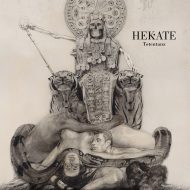 Hekate, who have been around since 1991, are one of Germany’s better known neofolk or dark folk bands. They play a mixture of folk, medieval and classical music, using historical and classical instruments, but also synthesizers, thus creating their very own sound. In the past, the lyrics were spun around myths and legends and often sung in different languages: German, English, French and Yiddish.
Hekate, who have been around since 1991, are one of Germany’s better known neofolk or dark folk bands. They play a mixture of folk, medieval and classical music, using historical and classical instruments, but also synthesizers, thus creating their very own sound. In the past, the lyrics were spun around myths and legends and often sung in different languages: German, English, French and Yiddish.
Totentanz (translated as “dance of death” in the press info, but “dance of the dead” is more accurate) is the band’s sixth album, delivered seven years after its predecessor. It features songs in German and English and is divided in two parts. The first part, spanning from tracks one to five, has male vocals, the second part female vocals, the last track Am Meere being the only exception. Apart from the vocals, the divide can also be heard in the soundscapes: The first part has richer soundscapes, involving more instruments. The second part is more minimalistic, thus emphasizing the vocals. Why this division has been made I can’t really say, but it certainly is an audible one.
The atmosphere, as set by the intro to the first track, is eerie, melancholy, but also dramatic. It is upheld throughout the album, with slight changes, the first part of the album being somewhat livelier.
The album’s highlights are the tracks Mondnacht, Luzifer Morgenstern and Totentanz. This is where Hekate are at their most convincing. The lyrics to Mondnacht are a poem with the same title by the German romantic poet Josef von Eichendorff, and while song versions of poems often sound strange, this one is truly beautiful. The poem has craving and yearning as a subject, or “Sehnsucht” a German word, for which there is no direct English translation. It means craving or yearning but involving a physical component and maybe an irrational and unhealthy one.
Of the songs with English lyrics, I like the second one, Lost and Broken, best. The heavy German accent does take some getting used to, I’m reluctant to say. However, it is just a fact, that Hekate sound best in their native German.
Lost and Broken is a song about heartbreak, about not knowing how to continue after having one’s heart broken. A nice detail about the song is that it starts with a fast-forwarding sound, like an old tape deck would produce, or a VCR. Meaning: There was a whole story that played out before this song. And now, at this point of time, the person is heartbroken.
The title track Totentanz is the first track with female vocals and the first song of the second part of the album. It comes across like a song you could hear in a play, at the theatre, performed by the female lead. Only minimal instruments accompany the vocals, making them very effective and stressing the lyrics. The song has death as a subject, wondering when it will come, what will it be like, and wishes for it to be like a dance.
The album’s cover art is very intriguing and definitely one of its stronger features. It is a so far unpublished painting by Franz Stassen, a German art nouveau artist, also titled Mondnacht (moon night). In composition and motive, it reminds me of Gustav Klimt’s Medicine and Life and Death. There is a pyramid of dead bodies, mostly men and one woman, circled by a big snake biting its tail, crowned by personified death on a throne. Impressive and effective. Death reigns supreme, the painting appears to say.
All in all, Hekate’s Totentanz is a beautiful and complete work of art, worth exploring, even if you don’t know any German.
(8/10 Slavica)

Leave a Reply